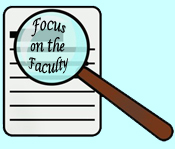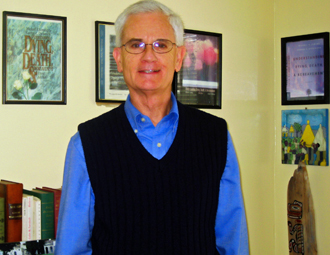Department of Sociology and Anthropology


"When you tell people you teach a course about death and dying they tend to give you a strange look," sociology professor George E. Dickinson explains. "It is not a well-known course like biology or chemistry. We just talk about the American way of death."
Dickinson has dedicated the past 35 years researching end-of-life issues. A nationally recognized expert in this unique field, Dickinson has written more than 20 books including "Understanding Dying, Death and Bereavement" with its seventh edition being released in June 2010. He has also written more than 70 articles that have been published in numerous journals over his career, and has presented more than 50 papers at professional meetings around the world.
Some of his research projects have studied the teaching of end-of-life issues in medical, dental, nursing and veterinary schools, physicians' attitudes toward death and terminally ill patients, physicians' attitudes toward assisted suicide and euthanasia, and roadside memorial policies in the United States. In the future, Dickinson would like to study medical schools in different countries to examine their attitudes towards death.
"Dr. Dickinson has been a colleague and mentor to both faculty and students," said fellow sociology professor Von Bakanic. "Year after year students continue to rave about his class on death and dying. I'm amazed by his energy and dedication to continuing scholarship. He is one of the foremost authorities on end-of -life issues."
All of his hard work has not gone unrecognized. In 2009, Dickinson received the Death Educator Award presented by the Association for Death Education and Counseling in Dallas, Tex. In 2008, he received the Distinguished Research Award at the College of Charleston. He has been recognized twice as a finalist for the Governor's Professor of the Year Award in South Carolina. He also received the Distinguished Teacher/Scholar Award at the College of Charleston in 2002.
Dickinson, who began his College of Charleston career in 1985, teaches courses in death and dying, development of social thought, and medical sociology.
"I enjoy the interaction with students and faculty," Dickinson said. "I have fun here. We have really great students."
Dickinson brings a unique teaching style into his classroom. Students in his classes have the opportunity to visit places such as the Medical University of South Carolina Children's Hospital, the gross anatomy lab at MUSC, Macaulay Museum of Dental History, the Circular Congregation Church Cemetery and a local funeral home.
"You learn more with the eye. I can show slides in class, but out in the cemetery you see the real thing," Dickinson explains.
Dickinson began teaching about end-of-life issues in 1974, after becoming interested in the topic through his students.
"Back in about 1974, one of my former students stopped in to chat," Dickinson says. "I asked him about his death and dying course in medical school. He had a sort of funny look on his face then answered, 'We don't have anything like that.' About the same time, we had a Nobel Conference at the college in Minnesota where I was teaching. The conference was titled 'The End of Life.' After that, my students in cultural anthropology began to write papers on how different cultures deal with the topic. Those two events sparked my interest in death and dying. So, I then offered a seminar on the topic. The seminar was limited to 15 students, but nearly 100 wanted in the course. Thus, I saw a real interest in this topic. And so it went."
Researchers and journalists from all over the world have sought Dickinson's expertise in this field. One of the biggest challenges Dickinson faces with his research is getting death and dying recognized as a specialty area in sociology. There has been much advancement in this area since he first began his research.
"It was a new area that I got involved in early on,"Dickinson recalls. "When I started teaching, there weren't any textbooks available. I had to use a bunch of paperbacks."
A native of Texas, Dickinson earned his bachelor's and master's degrees at Baylor University and his doctorate at Louisiana State University. Since 1987, Dickinson has been a volunteer for the Meals on Wheels program and delivers lunches to the elderly in their homes twice a month.
"We joke about sex and we joke about death because we feel uneasy about both of them," Dickinson said. "Death was a taboo topic for a long time. I think society is becoming more open, but we still have a long way to go."
###